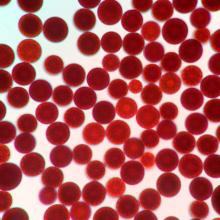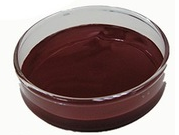Massive Selection for Astaxanthin Supply to Swaziland
Massive Selection for Astaxanthin Supply to Swaziland Detail:
[Latin Name] Haematococcus Pluvialis
[Plant Source] from China
[Specifications]1% 2% 3% 5%
[Appearance] Dark red Powder
[Particle size] 80 Mesh
[Loss on drying] ≤5.0%
[Heavy Metal] ≤10PPM
[Storage] Store in cool & dry area, keep away from the direct light and heat.
[Shelf life] 24 Months
[Package] Packed in paper-drums and two plastic-bags inside.
[Net weight] 25kgs/drum
Brief Introduction
Astaxanthin is a natural nutritional component, it can be found as a food supplement. The supplement is intended for human, animal, and aquaculture consumption.
Astaxanthin is a carotenoid. It belongs to a larger class of phytochemicals known as terpenes, which are built from five carbon precursors; isopentenyl diphosphate and dimethylallyl diphosphate . Astaxanthin is classified as a xanthophyll (originally derived from a word meaning “yellow leaves” since yellow plant leaf pigments were the first recognized of the xanthophyll family of carotenoids), but currently employed to describe carotenoid compounds that have oxygen-containing moities, hydroxyl or ketone , such as zeaxanthin and canthaxanthin. Indeed, astaxanthin is a metabolite of zeaxanthin and/or canthaxanthin, containing both hydroxyl and ketone functional groups. Like many carotenoids, astaxanthin is a colorful, lipid-soluble pigment. This colour is due to the extended chain of conjugated (alternating double and single) double bonds at the centre of the compound. This chain of conjugated double bonds is also responsible for the antioxidant function of astaxanthin (as well as other carotenoids) as it results in a region of decentralized electrons that can be donated to reduce a reactive oxidizing molecule.
Function:
1.Astaxanthin is a powerful antioxidant and may protect against oxidative damage to body tissues.
2.Astaxanthin can improve the immune response by increasing the number of antibody producing cells.
3.Astaxanthin is a potential candidate to treat neurodegenerative disease such as Alzhimer and Parkinson diease.
4.Astaxanthin dan reduce UVA-light damage to skin such as sunburn, inflammation, ageing and skin cancer.
Application
1.When applied in pharmaceutical field, astaxanthin powder has the good function of antineoplastic;
2.When applied in health food field, astaxanthin powder is used as food additives for pigment and health care;
3.When applied in cosmetic field, astaxanthin powder has the good function of antioxidant and anti-aging;
4.When applied in animal feeds field, astaxanthin powder is used as animal feed additive to impart coloration, including farm-raised salmon and egg yolks.
Product detail pictures:

Related Product Guide:
Our goal is usually to deliver high quality items at aggressive price ranges, and top-notch service to shoppers around the entire world. We're ISO9001, CE, and GS certified and strictly adhere to their high quality specifications for Massive Selection for Astaxanthin Supply to Swaziland , The product will supply to all over the world, such as: Angola, Turin, Lyon, "Good quality and reasonable price" are our business principles. If you are interested in our products or have any questions, make sure you feel free to contact us. We hope to establish cooperative relationships with you in the near future.
Isotonix OPC-3 contains the only isotonic form of Pycnogenol® in the world. Buy Isotonix OPC-3 at https://www.isotonicvitamins.com.
Watch more Vegetable Gardening videos: https://www.howcast.com/videos/308150-How-to-Grow-Garlic
If you’re looking to spice up your sauce, saute mushrooms, or keep vampires at bay, nothing is better than fresh homegrown garlic.
Step 1: Choose your garlic
Choose the type of garlic you’d like to grow. There are two garlic categories, softnecks and hardnecks.
Step 2: Prepare the bed
Prepare your bed by loosening the soil and adding fertilizer such as compost.
Step 3: Plant the cloves
Plant as close to the autumnal equinox as possible and plant the cloves, root side down, in 2-inch-deep holes, 8 inches apart from each other.
Tip
To protect your crop from fungal diseases and pest infestations, soak each clove in water mixed with 1 tablespoon baking soda and 1 tablespoon liquid seaweed per gallon.
Step 4: Mulch
Mulch around emerging green shoots them from frost. Keep the soil moist – but not wet – and weed-free.
Step 5: Harvest
Harvest your garlic when most of the lower leaves have turned brown. Gently dig around the bulb and remove it from the soil.
Tip
Don’t wait for all the leaves to be brown – the bulbs will split.
Step 6: Store the garlic
Store your garlic in a moderately humid area between 50 and 65 degrees. Once you’re ready to dig in, peel back the skin, and enjoy the pungent perfection.
Did You Know?
The ingredient in garlic that is responsible for its pungent smell as well as its antibacterial and potential healing properties is called allicin.
Good quality and fast delivery, it's very nice. Some products have a little bit problem, but the supplier replaced timely, overall, we are satisfied.







